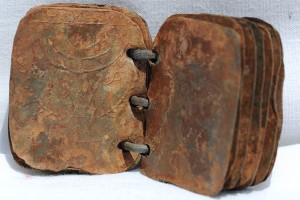Boy, Mark gets right down to business. There’s no long list of who begat whom, and no story of the birth of Jesus. He starts his Gospel with John out baptizing in the wilderness. Good ol’ John, wearing camel’s hair with a belt around his middle and eating locusts and wild honey. He preached:
“After me comes he who is mightier than I, the thong of whose sandals I am not worthy to stoop down and loosen. I baptized you in water, but he will baptize you in the Holy Spirit.”
Jesus comes from Nazareth and gets baptized by John. As soon as Jesus comes up from the water, the heavens part and the Spirit descends on Him like a dove. A voice says:
“You are my beloved Son, in whom I am well pleased.”
The spirit then drives Jesus into the wilderness for forty days. Satan tempts Him, He lives with wild animals, and angels are there serving Him. After John is seized, Jesus begins preaching and collecting followers. He casts demons out of people, and heals others. The word gets out, crowds start to form, and Jesus heals many, many others.
Early one morning, seeking peace, Jesus goes out by himself in the desert to pray. Simon tracks him down and says, “Everyone is looking for you.” Jesus replies:
“Let’s go elsewhere into the next towns, that I may preach there also, because I came out for this reason.”
So they move on and preach and heal more people, including a leper. Jesus tells the former leper to keep quiet, but the man does just the opposite and soon Jesus can no longer go into cities. He stays out in the desert and the crowds come to Him.
Chapter 2
Jesus goes into Capenaum for more preaching and forgiving of sins. Some scribes whisper among themselves that it is blasphemy, but Jesus tells them that the “Son of Man has authority on earth to forgive sins.” The scribes and Pharisees then see Jesus hanging out with tax collectors and sinners. They want to know why. Jesus answers:
“Those who are healthy have no need for a physician, but those who are sick. I came not to call the righteous, but sinners to repentance.”
Then the Pharisees want to know why His disciples don’t fast, while others, like the disciples of John, do fast.
“Can the groomsmen fast while the bridegroom is with them? As long as they have the bridegroom with them, they can’t fast. But the days will come when the bridegroom will be taken away from them, and then will they fast in that day.”
The Pharisees then complain about the disciples plucking ears of grain on the Sabbath. He sets them straight with:
“The Sabbath was made for man, not man for the Sabbath. Therefore, the Son of Man is lord even of the Sabbath.”
Chapter 3
Jesus enters the synagogue and meets a man with a withered hand. The Pharisees watch carefully to see if Jesus will heal on the Sabbath. He asks them:
“Is it lawful on the Sabbath day to do good or to do harm? To save a life, or to kill?
The Pharisees are silent, but Jesus gets angry at the “hardening of their hearts,” so He heals the man. The Pharisees immediately huddle up with the Herodians to figure out how they might destroy Jesus.
Jesus then heads to the sea, followed by a huge throng. You can get the sense he’s a little freaked out by the people pressing down upon Him as he tells his disciples to keep a little boat nearby just in case. He then heads up into the mountains and appoints 12 as disciples so that he may send them out to preach and to cast out demons and heal sickness. The scribes think He’s insane and say, “He has Beelzebul” to which Jesus replies:
“How can Satan cast out Satan?”
As in Matthew, Jesus’ mother and brother come, wishing to see Him.
“Who are my mother and brothers? [He looks at those sitting around him] Behold! my mother and brothers! For whoever does the will of God, the same is my brother, and my sister, and my mother.”
Chapter 4
In this chapter, Jesus preaches through the parable of sowing seed. Some seed falls by the road and the birds snatch it up. Others fall in thin, rocky soil and sprout quickly, but wither with the sun because they have no root. Other seed falls in among thorns and get choked. Finally, others fall into good ground and yield amazing amounts of fruit.
The disciples need help deciphering the parable so Jesus explains. The birds are Satan. The ones in rocky soil are those people who have no root in themselves and give up at the first sign of oppression or persecution. The ones in the thorns are those people consumed by material wants and the “deceitfulness of riches.” The seed that falls in good ground represents those who “hear the word, and accept it.”
Jesus preached only in parables to the crowd, but in private explained them to His disciples. He then decides to head to the other side and everyone jumps into boats. In the middle of the night, a huge storm kicks up and fills the boat with water. They wake up Jesus who is asleep on a cushion, “Teacher, don’t you care that we are dying?” Jesus rebukes the sea, the wind stops, and He turns to his disciples:
“Why are you so afraid? How is it that you have no faith?”
Next Week: Mark, Chapters 5-8


Join What He Said Online